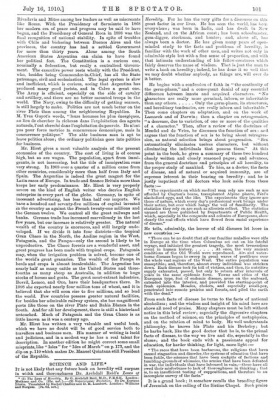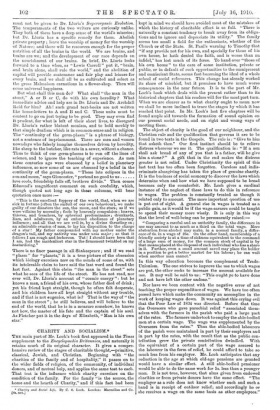SCIENCE AND LIFE.*
IT is not likely that any future book on heredity will surpass in width and thorouglmess Dr. Archdall Reid's Laws of • (1) The Laws of Heredity. By G. Arehdall Reid, M.D., F.R.S.E. London : Methuen and Co. [21s. net.]--- .) Supororyunic Evolution. By Dr. Enrique Lluria. Translated by Rachel ce and D. H. Lambert. London r Williams and Norgate. f7e. 6d. net.1
Heredity. For he has the very gifts for a discourse on this great factor in our lives. He has seen the world, has been everywhere; was born in India, and has dwelt in New
Zealand, and on the African coast ; has been schoolmaster, gum-digger, stockman, and hunter; and, above all, has
always been a doctor. He has given many years of open- minded study to the facts and problems of heredity, is familiar with the work of other men, and writes not only in admirable style but with a fine sense of proportion, and with that intimate understanding of his fellow-creatures which fairly deserves the name of wisdom. That is just the man to write a book on heredity; indeed, he has done it so well that we may doubt whether anybody, as things are, will ever do it better.
He begins with a confession of faith in "the continuity of the germ-plasm," and a consequent denial of any essential difference between innate and acquired characters. "No gbaracters are really more germinal, inborn, or inheritable than any others Only the germ-plasm, its structures, and hereditary tendencies, are really inborn and inheritable." Then come chapters on adaptation, and on the work of Lamarck and of Darwin ; then a chapter on retrogression, "a decrease, due to variation, of one or more of the qualities of a character." Then, after a review of the doctrines of Mendel and de Vries, he discusses the function of sex : acd argues that the function of sex is to bring about retrogres- sion, as natural selection brings about progression. " Sex automatically eliminates useless characters, but without eliminating the individuals that possess them." At this point in the book, he gives a summary of these two hundred closely written and closely reasoned pages; and advances, from the general doctrines and principles of all heredity, to the proper study of mankind. To him, as a doctor, the facts of disease, and of natural or acquired immunity, are of supreme interest in their bearing on heredity : and he is justly impatient of all doctors who look aside from these facts :—
" The experiments on which medical men rely are such as are afforded by Clayton's beans, transplanted Alpine plants, Fare's aleoholised eggs, and the like. The experiments they ignore aro those of nature, which every day's professional work brings under their notice, but over which hangs the veil of familiarity. The statistics they rely on are such as alienists collect. The statistics unused are those published by Departments of Public Health, which, especially in the conquests and colonies of Europeans, show clearly the real effects which have flowed from racial experience of disease."
He tells, admirably, the horror of old diseases let loose in new countries :— " There can be no doubt that all our familiar maladies were rife in Europe at the time when Columbus set out on his fateful voyage, and initiated the greatest tragedy, the most tremendous
event in human history At once, the very ancient conditions of the Old World were reproduced. Air- and water- borne diseases began to sweep in great waves of pestilence over the whole vast regions of the West. The entire population was susceptible; and, therefore, almost every individual was stricken down. Tlach disease took its toll of victims, and then, its nutritive supply exhausted, passed, but only to return after intervals of years in the same epidemic form. Towns and cities of the European type, foci of endemic disease, arose on the seaboard, extended into the interior, and provided the starting-point of fresh epidemics. Measles, cholera, and especially small-pox, penetrated into remote prairies and forests, and piled the earth with the dead."
From such facts of disease he turns to the facts of national alcoholism; and the wisdom and insight of his mind here are above all need of praise. Many chapters must be left without
notice in this brief review; especially the digressive chapters on the method of science, on the principles of metaphysics, and on the relation of mind to body. He well understands philosophy, he knows his Plato and his Berkeley ; but he harks back, like the good doctor that he is, to the primal facts of disease, to the way we live and die, especially in the slums; and the book ends with a passionate appeal for education, for harder thinking, for light, more light :—
" The races that have been barbarous, the religions that have caused stagnation and disorder, the systems of education that have been futile, the sciences that have been cockpits of factions and tumbling-grounds of whimsies, the armies that have been defeated in war, the individuals that have laboured in vain,—these have all owed their misfortunes to lack of thoroughness in thinking ; that is, to an insufficient testing of suppositions, and therefore to an incomplete survey of the facts."
It is a grand book; it somehow recalls the brooding figure of Jeremiah on the ceiling of the Sistine Chapel. Such praise
must not be given to Dr. Lluria's Superorganic Evolution. The temperaments of the two writers are curiously unlike. They both of them have a deep sense of the world's miseries; but Dr. Lluria has a specific remedy for them. Abolish private property ; leave the worship of money for the worship of Nature; and there will be resources enough for the proper nutrition of all the brains in the world. We are brains, and brains are we; and the development of our race depends on the nourishment of our brains. In brief, Dr. Lluria looks forward to a time when, as "Lewis Carroll" put it, "brain, and brain alone, shall rule the world," and the abolition of capital will provide sustenance and fair play and leisure for every brain, and we shall all be as cultivated and select as the gross Malmaison carnations in a flower-shop. Then will come universal happiness.
But what shall this man do P What shall "the man in the street," A or B or C, do with his own heredity P What immediate advice and help are in Dr. Lluria and Dr. Archdall Reid for him P Ah ! such grand text-books are not written like home-letters to A and B and C. These units must be content to go on just trying to be good. They may even find it prudent, for what is left of their short lives, to disregard Dr. Lluria's rather blatant monism, and to hold meekly to that simple dualism which is in common-sense and in religion. The "continuity of the germ-plasm" is a phrase of biology, not a sentence of imprisonment. There are men and women nowadays who falsely imagine themselves driven by heredity, like sheep to the butcher, like rats in a sewer, without a chance. Thus to think of our germ-plasma is to run off the lines of science, and to ignore the teaching of experience. As men three centuries ago were obsessed by a belief in planetary influences, so now some of us are obsessed by a belief in the continuity of the germ-plasm. "These late eclipses in the
sun and moon," says Gloucester, " portend no good to us love cools, friendship falls off, brothers divide." Then comes Edmund's magnificent comment on such credulity, which, though quoted not long ago in these columns, will bear quotation once more :-
"This is the excellent foppery of the world, that, when we are sick in fortune (often the surfeit of our own behaviour), we make guilty of our disasters the sun, the moon, and the stars ; as if we were villains by necessity ; fools by heavenly compulsion ; knaves, thieves, and treachery, by spherical predominance ; drunkards, liars, and adulterers, by an enforced obedience of planetary influence ; and all that we are evil in, by a divine thrusting on ; an admirable evasion of man, to lay his disposition to the charge of a star ! My father compounded with my mother under the dragon's tail, and my nativity was under Ursa major; ; so that it follows I am rough and lecherous. Tut 1 I should have been that I am, had the maidenliest star in the firmament twinkled on my bastardizing."
There is no finer passage in all Shakespeare ; and if we read " plasm" for "planets," it is a true picture of the obsession which biology exercises now on the minds of some of us, with its intolerable claim to have said the last word and found the last fact. Against this claim "the man in the street" sets what he sees of the life of the street. He has not read, nor ever will, Dr. Lluria's account of "cosmic energy " : but he knows a man, a friend of his own, whose father died of drink ; yet his friend kept straight, though he often felt desperate, and his children have all kept straight without any trouble, and if that is not eugenics, what is P That is the way of " the man in the street " ; he still believes, and will believe to the end of the world, that he is in a measure somehow, he knows not how, the master of his fate and the captain of his soul. As Fletcher put it in the days of Elizabeth, "Man is his own star."







































 Previous page
Previous page